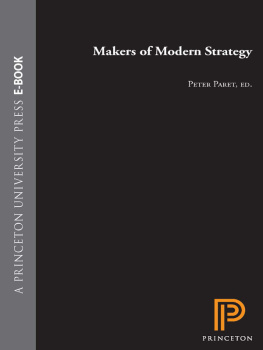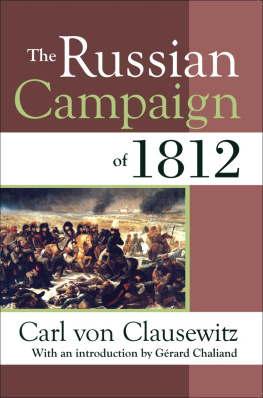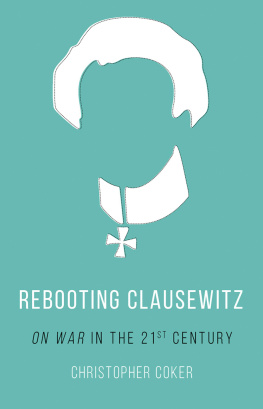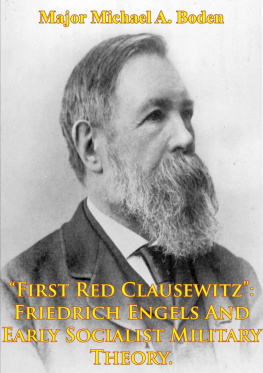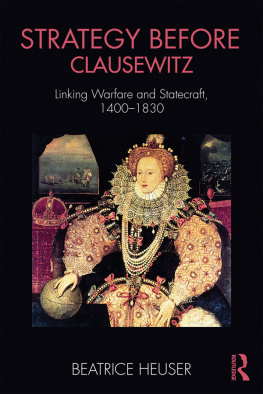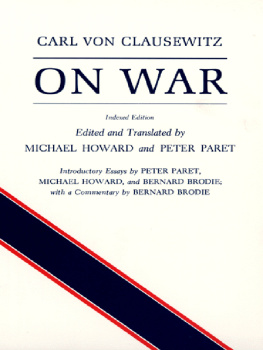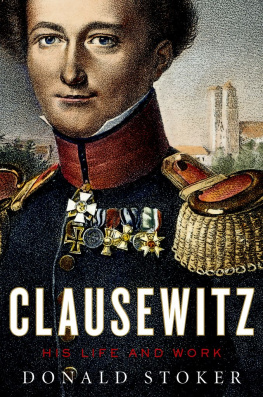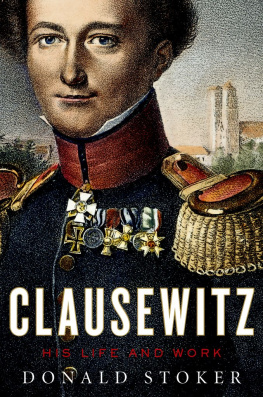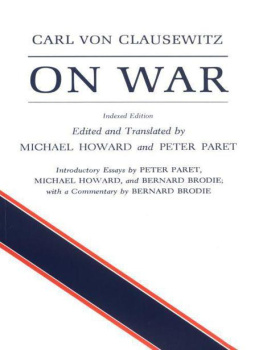COPYRIGHT 1992 BY PRINCETON UNIVERSITY PRESS
PUBLISHED BY PRINCETON UNIVERSITY PRESS, 41 WILLIAM STREET,
PRINCETON, NEW JERSEY 08540
IN THE UNITED KINGDOM: PRINCETON UNIVERSITY PRESS,
CHICHESTER, WEST SUSSEX
ALL RIGHTS RESERVED
LIBRARY OF CONGRESS CATALOGING-IN-PUBLICATION DATA PARET, PETER.
UNDERSTANDING WAR : ESSAYS ON CLAUSEWITZ AND THE HISTORY OF MILITARY POWER / PETER PARET
P. CM.
INCLUDES INDEX.
ISBN 0-691-03199-1
ISBN 0-691-00090-5 (PBK.)
1. WAR. 2. CLAUSEWITZ, CARL VON, 17801831. 3. MILITARY ART AND SCIENCEHISTORY. 4. MILITARY HISTORY, MODERN. I. TITLE.
U21.2.P32 1992 355.02DC20 91-37491 CIP
eISBN: 978-0-691-21603-4
R0
ACKNOWLEDGMENTS
I SHOULD LIKE to express my thanks to David Nelson Blair for imposing a reasonable consistency on texts that first appeared at different times in a variety of publications, to Carol Starnes, who handled the design of the book, to Don Hatch, who designed the jacket, and to Harriet Hitch, who gave such matters as the jacket and catalog copy the attention they deserve. As so often before I am especially indebted to Joanna Hitchcock for the interest and care with which she watched over the manuscript and guided it toward publication.
The following essays are reprinted by the kind permission of their original publishers:
Essay One from the Journal of Military History 53, no. 3 (1989); first given as a lecture at a symposium on power at the Shelby Cullom Davis Center for Historical Studies, Princeton University, in 1989.
Essay Two from Reconsiderations on the Revolutionary War, ed. Don Higginbotham, copyright (c) by Don Higginbotham, Greenwood Press, Westport, 1978; first given as a lecture at a symposium on the American Revolutionary War at the United States Military Academy, West Point, New York, in 1976.
Essay Three from Military Affairs 34, no. 1 (1970).
Essay Four from Geschichte als Aufgabe: Festschrift fr Otto Bsch, ed. Wilhelm Treue, Colloquium Verlag, Berlin, 1988; first given as a lecture at the Lawrence Gipson Symposium on the End of the Ancien Rgime at Lehigh University in 1981.
Essay Five from Proceedings, the Consortium on Revolutionary Europe, 1983, ed. Clarence B. Davis, University of Georgia, Athens, 1985; first given as a banquet address at the 1983 meeting of the Consortium.
Essay Six from Great Military Battles, ed. Cyril Falls, Weidenfeld and Nicolson, London, 1964.
Essay Seven from Makers of Modern Strategy, ed. Peter Paret, Princeton University Press, Princeton, 1986.
Essay Eight from Carl von Clausewitz, Two Letters on Strategy, eds. Peter Paret and Daniel Moran, copyright (c) by Peter Paret, U.S. Army War College Foundation, Carlisle Barracks, 1984.
Essay Nine from Carl von Clausewitz, Historical and Political Writings, eds. Peter Paret and Daniel Moran, Princeton University Press, Princeton, 1992.
Essay Ten from Journal of the History of Ideas 49, no. 1 (1988).
Essay Eleven from Festschrift fr Eberhard Kessel, eds. Heinz Duchhardt and Manfred Schlenke, Wilhelm Fink Verlag, Munich, 1982; first given as a banquet address at the annual meeting of the German Studies Association in 1979.
Essay Twelve from Freiheit ohne Krieg? ed. Ulrich de Maiziere, Dmmler Verlag, Bonn, 1980; first given as a lecture at a symposium of the Clausewitz Gesellschaft in 1980.
Essay Thirteen from Jahrbuch fr die Geschichte Mittel- und Ostdeutschlands, 26 (1977).
Essay Fourteen under the title An Anonymous Letter by Clausewitz on the Polish Insurrection of 1830-1831, from the Journal of Modern History 42, no. 2 (1970).
Essay Fifteen from the Journal of Military History 55, no. 2 (1991).
Essay Sixteen from Daedalus, Journal of the American Academy of Arts and Science, 100, no. 2 (1971), and Parameters 31, no. 3 (1991); the second part was first given as a banquet address at the annual meetings of the American Military Institute in 1991.
The human mind... has a universal thirst for clarity, and
longs to feel itself part of an orderly scheme of things.
Carl von Clausewitz
INTRODUCTION
W AR HAS its own characteristics but is linked to all other areas of society and culture. It is both unique and subsumed in the generality of the human experience. This dualism, which it shares with everything else in life, imposes a fundamental choice on historians who take war as their subject. They can interpret war in its context, or they can concentrate on its instrumental centerthe phenomenon of violenceand pay less attention to the nonviolent elements that surround and penetrate war. The alternatives need not be absolute, of course; but it is surprising how often interpretations of the second kind leave out the nonviolent context altogether or address it only in passing. Treated in this manner, their subject takes on the appearance of a contest fought in a vacuum, an agonistic drama played out by opponents whose strength, courage, and cunning are all that matters.
Both approaches have advantages as well as weaknesses, and both have led to good history. Historians who are mainly interested in tracing the course of battle may feel that a narrow focus serves them best. A broader perspectivethough of necessity it will still be selectiveruns the danger of obscuring the violent core or of reducing its significance. But that need not be the case. There have always been historians who link their narratives of operations in the field to discussions of the political circumstances that gave rise to them and continue to affect them, and of the other countless elementsranging from social conditions to the management of economic resourcesthat shape the fighting and help determine its outcome. On the whole I find this approach more interesting. Not only does it address matters that historians of war too often ignore although they are of great importance to their subject, usually it also holds the key for a full understanding of the fighting.
No one would claim that a strategic plan is based on military factors alone. The political motives and consequences of the plan are only some of the many nonmilitary elements involved. But it is equally true that every segment of military policy and action, down to the level of small-unit tactics, is influenced by any number of factors beyond the strictly military. To understand why men fought in a certain fashion we must know something of their circumstances before they heaved the first rock or fired the first shot. The Duke of Wellington recognized his own worth too clearly, and was far too clever, to have said that the battle of Waterloo was won in the playing fields of Eton. But if we enlarge this fictional homage to the English gentleman to encompass all aspects of the society in which he assumed a major place, the statement makes a valid point. The background, schooling, attitudes, and regimental traditions of the officer; the social antecedents, motives for serving, treatment, and drill of the rank and file; the bonds of deference and duty that held the common soldier firmly in his assigned placeall these help explain the specific tactical behavior of the British forces at the time and the ways in which it differed from the methods of their Dutch and Prussian allies and their French opponents. Of course, the actual clash of opposing armies and the movements that led to it form only a part of any battle, and the battle of Waterloo, above all, can hardly be understood if we limit ourselves to the actions of commanders and men between 15 June and 18 June 1815.


